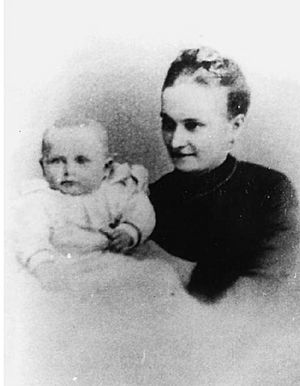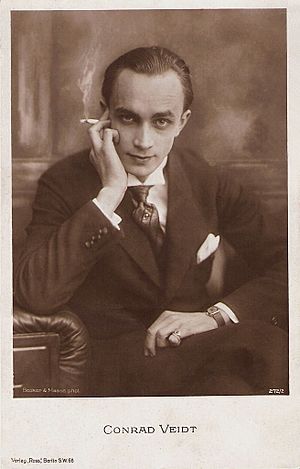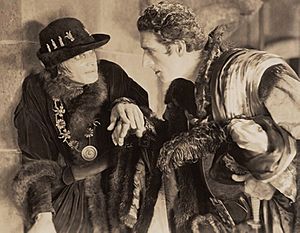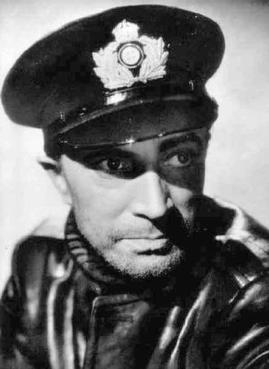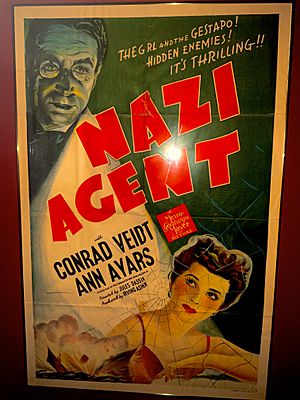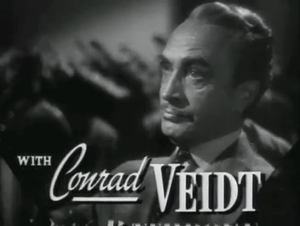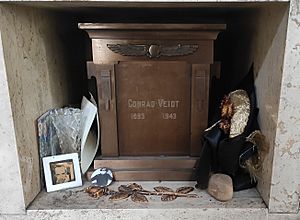Conrad Veidt facts for kids
Quick facts for kids
Conrad Veidt
|
|
|---|---|
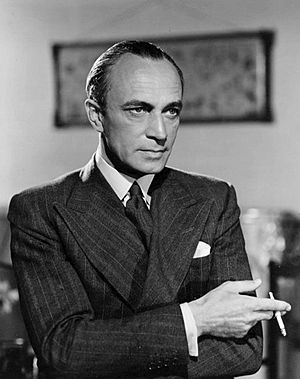
Veidt in 1941
|
|
| Born |
Hans Walter Conrad Veidt
22 January 1893 Berlin, German Empire
|
| Died | 3 April 1943 (aged 50) Los Angeles, California, U.S.
|
| Resting place | Golders Green Crematorium, North London |
| Occupation | Actor |
| Years active | 1913–1943 |
| Spouse(s) |
Gussy Holl
(m. 1918; div. 1922)Felizitas Radke
(m. 1923; div. 1932)Ilona Prager
(m. 1933) |
| Children | 1 |
| Signature | |
 |
|
Hans Walter Conrad Veidt (born January 22, 1893 – died April 3, 1943) was a famous German film actor. He became well-known for his roles in movies like Different from the Others (1919), The Cabinet of Dr. Caligari (1920), and The Man Who Laughs (1928).
Conrad Veidt had a very successful career in German silent films, where he was one of the highest-paid stars. In 1933, after the Nazis came to power in Germany, he and his wife, Ilona Prager, who was Jewish, left the country. They moved to Britain, and Conrad became a British citizen in 1939. He acted in many British films, including The Thief of Bagdad (1940). Around 1941, he moved to the United States. There, he got one of his most famous roles as Major Strasser in the movie Casablanca (1942). This was the last film of his to be released while he was alive.
Contents
Early Life and First Steps in Acting
Conrad Veidt was born on January 22, 1893, in Berlin, Germany. His parents were Amalie Marie and Philipp Heinrich Veidt. His father was a former soldier who worked for the government. Conrad had an older brother, Karl, who sadly died at age 9 from scarlet fever in 1900.
When Conrad was young, he wanted to become a surgeon, like the doctor who helped his father. However, he found medical studies too difficult. His path changed in 1911 during a school play. He performed so well that people noticed his talent. This made him want to become an actor, even though his father did not approve.
Conrad started going to many theaters in Berlin. He took acting lessons and eventually got a small role as an extra at the Deutsches Theater in 1913. He played minor parts, like soldiers.
World War I and Return to Acting
In 1914, World War I began, and Conrad joined the army. He was sent to the Eastern Front in 1915. He became sick with jaundice and pneumonia and was sent to a hospital. While recovering, he joined a theater group that entertained soldiers. In 1917, he was discharged from the army because of his health. He returned to Berlin and continued acting at the Deutsches Theater.
Acting Career Highlights
From 1917 until he passed away, Conrad Veidt acted in over 100 films. One of his first important roles was as Cesare, a sleepwalking murderer, in the 1920 film The Cabinet of Dr. Caligari. This movie is a classic example of German Expressionist cinema.
Another famous role was in The Man Who Laughs (1928). He played a character whose face was cut into a permanent grin. This look later inspired the famous Batman villain, the Joker. Conrad also starred in other silent horror films, such as The Hands of Orlac (1924) and Waxworks (1924), where he played Ivan the Terrible.
He also appeared in Different from the Others (1919), one of the first films to show homosexual characters in a sympathetic way. In 1929, he had a main role in Germany's first talking picture, Das Land ohne Frauen (Land Without Women).
Moving to Hollywood and Back
In the late 1920s, Conrad moved to Hollywood. He made a few films there. However, when talking pictures became popular, he found it hard to speak English well enough for roles. So, he returned to Germany. During this time, he helped teach acting to new performers.
Leaving Germany and Anti-Nazi Efforts
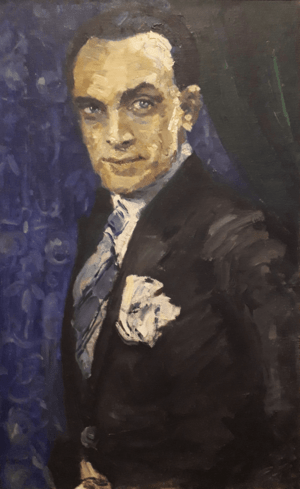
Conrad Veidt strongly disagreed with the Nazi government. He later gave money to help people in Britain during the German bombings. In March 1933, the Nazi Party took power in Germany. They started removing people who disagreed with them or who were Jewish from the film industry.
In April 1933, a week after Conrad married Ilona Prager, who was Jewish, they both left Germany. They moved to Britain before the Nazis could take action against them.
The Nazi government made everyone in the film industry fill out a "racial questionnaire." When Conrad filled out his, he wrote "Jew" for his race. Conrad himself was not Jewish, but his wife was. He did this to show his support for his wife and for the Jewish community. He refused to work with the Nazi government. He was told he could keep acting in Germany if he divorced his wife and supported the Nazis, but he refused. This meant he could no longer work in Germany.
After moving to Britain, Conrad improved his English. He starred in anti-Nazi films like The Wandering Jew (1933) and Jew Süss (1934). He became a British citizen in 1939. He also made films in French and English, including three well-known movies for British director Michael Powell: The Spy in Black (1939), Contraband (1940), and The Thief of Bagdad (1940).
Later Career in the US
By 1941, Conrad and Ilona moved to Hollywood in the United States. They wanted to help the British effort by making American films that might convince the U.S. to join the war against the Nazis. Before leaving the UK, the Veidts gave a large part of their savings to the British government to help with the war.
Conrad knew that in Hollywood, he would likely be cast as Nazi characters. So, he made sure his acting contracts stated that these characters must always be villains.
He starred in films like A Woman's Face (1941) and Nazi Agent (1942), where he played both a Nazi spy and his anti-Nazi twin brother. His most famous Hollywood role was as the evil Major Heinrich Strasser in Casablanca (1942). Conrad found it ironic that he was praised for playing the type of character who had forced him to leave his home country.
Personal Life
Conrad Veidt enjoyed sports, gardening, swimming, golfing, classical music, and reading.
He married Gussy Holl, a cabaret entertainer, in 1918. They divorced in 1922.
His second wife was Anna Maria "Felizitas" Radke, from an Austrian family. They married in 1923. Their daughter, Vera Viola Maria, nicknamed "Kiki," was born in 1925. Conrad was very happy to become a father.
From 1926 to 1929, Conrad lived with his wife and daughter in Beverly Hills, California. He enjoyed spending time with his daughter and with other immigrant friends like Greta Garbo. The family returned to Germany in 1929.
Radke and Veidt divorced in 1932. Conrad made sure his daughter, Viola, had a good home with her mother, but he had generous visitation rights. Viola called her summer vacations with her father "The Happy Times." She stayed with him for three or four months each year until World War II started. Viola passed away in 2004.
Conrad's last marriage was to Flora Ilona Barta Greger, a Hungarian Jewish woman also known as “Lilli” or “Lily,” in Berlin on March 24, 1933. They stayed together until his death.
Conrad and Lilli moved from London to Los Angeles in 1940. Conrad was very caring. In 1940, he donated money to buy gifts for 2,000 children in London who were staying in air raid shelters during Christmas. He also helped his parents-in-law escape from Austria to Switzerland. In 1935, he even managed to get the Nazi government to let his ex-wife Radke and their daughter move to Switzerland.
Death and Legacy
In the 1930s, Conrad learned he had a heart condition, the same one that had caused his mother's death. This condition was made worse by his smoking.
Conrad Veidt died of a heart attack on April 3, 1943, while playing golf in Los Angeles. He was 50 years old.
The Conrad Veidt Society (CVS) was formed in 1990 to honor him. This group helped find a final resting place for his ashes. On April 3, 1998, 55 years after his death, Conrad Veidt's ashes, mixed with those of his wife Lily, were placed in a special niche at the Golders Green Crematorium in north London. The ceremony was attended by people from different countries and was even broadcast on BBC Radio.
Complete Filmography
| Year | Title | Role | Notes |
|---|---|---|---|
| 1917 | The Path of Death | Rolf | Filmed in late 1916, Veidt's screen debut. Lost film |
| 1917 | Let There Be Light | Herr Kramer | The film had four parts which premiered throughout 1917 to 1918. Lost film |
| 1917 | When the Dead Speak | Richard von Worth | Lost film |
| 1917 | Fear | Indian Priest | Print exists at the Swedish Film Institute |
| 1917 | The Sea Battle | Lost film | |
| 1917 | The Spy | Steinau | Lost film |
| 1918 | The Mystery of Bangalore | Dinja | Lost film |
| 1918 | The Serenyi | Lost film | |
| 1918 | The Mexican | Lost film | |
| 1918 | The House of Three Girls | Baron Schober | Lost film |
| 1918 | Diary of a Lost Woman | Dr. Julius | Lost film |
| 1918 | Jettchen Gebert's Story | Doctor Friedrich Köstling | Lost film |
| 1918 | Colomba | Henrik van Rhyn | Lost film |
| 1918 | The Story of Dida Ibsen | Erik Norrensen | Print exists at the George Eastman House |
| 1918 | Henriette Jacoby | Doctor Friedrich Köstling | Lost film |
| 1918 | Victim of Society | Prosecutor Chrysander | Lost film |
| 1918 | Not of the Woman Born | Satan | Lost film |
| 1919 | Nocturne of Love | Frederic Chopin | Lost film |
| 1919 | The Japanese Woman | The Secretary | Lost film |
| 1919 | Around the World in Eighty Days | Phileas Fogg | This film exists in the Archiv Filmkunde Paul Sauerlaender |
| 1919 | Peer Gynt (2 parts) | Ein fremder Passagier | Lost film |
| 1919 | Different from the Others | Paul Körner | Restored version of the film exists |
| 1919 | The Ocarina | Jaap | Lost film |
| 1919 | Prince Cuckoo | Karl Kraker | Lost film |
| 1919 | Madness | Bankier Lorenzen | Veidt's directorial debut, lost film |
| 1919 | Eerie Tales | Death (framing story) / The stranger (ep.1) / The assassin (ep.2) / Traveller (ep.3) / Club president (ep.4) / Husband (ep.5) | Original negative is lost, but a restored version of the film exists |
| 1920 | The Count of Cagliostro | The Minister | Lost film |
| 1920 | Figures of the Night | Clown | Lost film |
| 1920 | Satan | Lucifer / Hermit / Gubetta / Grodski | Lost film |
| 1920 | The Cabinet of Dr. Caligari | Cesare | |
| 1920 | The Merry-Go-Round | Petre Karvan | |
| 1920 | Patience | Sir Percy Parker | Lost film |
| 1920 | The Night at Goldenhall | Lord Reginald Golden / Harald Golden | Directed by Veidt, lost film |
| 1920 | The Eyes of the World | Johannes Kay, Julianne's Lover | Lost film |
| 1920 | Temperamental Artist | Arpad Czaslo | |
| 1920 | Kurfürstendamm | Satan | Lost film |
| 1920 | Der Januskopf | Dr. Warren / Mr. O'Connor | Lost film |
| 1920 | Moriturus | Wilmos | Lost film |
| 1920 | The Clan | ||
| 1920 | Evening – Night – Morning | Brilburn – Maud's brother | Lost film |
| 1920 | Manolescu's Memoirs | Manolescu | Lost film |
| 1920-1921 | Christian Wahnschaffe (2 parts) | Christian Wahnschaffe | Opening act does not survive but the remainder of the film was restored in 2018 |
| 1921 | The Secret of Bombay | Dichter Tossi | |
| 1921 | Journey into the Night | The Painter | |
| 1921 | Love and Passion | Jalenko, the Gypsy | Lost film |
| 1921 | The Love Affairs of Hector Dalmore | Hektor Dalmore | Print exists at the Cinémathèque royale de Belgique |
| 1921 | Desire | Ivan – a young Russian dancer | Lost film |
| 1921 | Country Roads and the Big City | Raphael, der Geiger | Print exists at the Cinémathèque royale de Belgique |
| 1921 | Danton | ||
| 1921 | Lady Hamilton | Lord Nelson | Copy exists in a Russian film archive |
| 1921 | The Indian Tomb (2 parts) | Ayan III / Prince von Eschnapur / The Majarajah of Bengal | |
| 1921 | The Passion of Inge Krafft | Hendryck Overland | |
| 1922 | Lucrezia Borgia | Cesare Borgia | |
| 1923 | Paganini | Niccolò Paganini | Lost film |
| 1923 | William Tell | Hermann Gessler | |
| 1923 | Gold and Luck | The Count | Lost film |
| 1923 | Bride of Vengeance | Cesare Borgia | Lost film |
| 1924 | Carlos and Elisabeth | Don Carlos | |
| 1924 | The Hands of Orlac | Paul Orlac | |
| 1924 | Waxworks | Ivan the Terrible | |
| 1924 | Husbands or Lovers | Der Liebhaber, ein Dichter | |
| 1925 | Count Kostia | Count Kostia | Lost film |
| 1925 | Love is Blind | Dr. Lamare | Lost film |
| 1925 | Destiny | Count L. M. Vranna | Lost film |
| 1925 | Ingmar's Inheritance | Hellgum | |
| 1926 | The Fiddler of Florence | Renées Vater | |
| 1926 | The Brothers Schellenberg | Wenzel Schellenberg / Michael Schellenberg | Bad quality print exists |
| 1926 | Should We Be Silent? | Paul Hartwig, Maler | Exists in fragmentary form |
| 1926 | The Woman's Crusade | Prosecutor | |
| 1926 | The Student of Prague | Balduin, a student | |
| 1926 | The Flight in the Night | Heinrich IV | |
| 1927 | The Beloved Rogue | King Louis XI | |
| 1927 | A Man's Past | Paul La Roche | Presumed lost |
| 1928 | The Man Who Laughs | Gwynplaine / Lord Clancharlie | Won a Golden Train Award for Best Actor |
| 1929 | Gesetze der Liebe | Exists and contains newly edited material from Different from the Others | |
| 1929 | Land Without Women | Dick Ashton, telegrapher | Veidt's talkie debut, lost film |
| 1929 | The Last Performance | Erik the Great | Filmed and released in New York in 1927, exists but 10 minutes are missing |
| 1930 | The Last Company | Hauptmann Burk | |
| 1930 | Menschen im Käfig (People in the Cage) | Kingsley | Lost film |
| 1930 | The Great Longing | Himself | |
| 1931 | The Man Who Murdered | Marquis de Sévigné | |
| 1931 | The Night of Decision | General Gregori Platoff | Lost film |
| 1931 | The Other Side | Hauptmann Stanhope | Exists but 10 minutes are possibly missing |
| 1932 | Rasputin, Demon with Women | Grigori Rasputin | |
| 1932 | The Congress Dances | Prince Metternich | |
| 1932 | The Black Hussar | Rittmeister Hansgeorg von Hochberg | |
| 1932 | Rome Express | Zurta | |
| 1933 | The Empress and I | Marquis de Pontignac | |
| 1933 | F.P.1 | Maj. Ellissen | |
| 1933 | I Was a Spy | Commandant Oberaertz | |
| 1933 | The Wandering Jew | Matathias | |
| 1934 | William Tell | Gessler (both German- and English-language versions) | |
| 1934 | Jew Süss | Josef Süss Oppenheimer | |
| 1934 | Bella Donna | Mahmoud Baroudi | |
| 1935 | The Passing of the Third Floor Back | The Stranger | |
| 1935 | King of the Damned | Convict 83 | |
| 1937 | Dark Journey | Baron Karl Von Marwitz | |
| 1937 | Under the Red Robe | Gil de Berault | |
| 1938 | Storm Over Asia | Erich Keith | |
| 1938 | The Chess Player | Baron Kempelen | |
| 1939 | The Spy in Black | Captain Hardt | |
| 1940 | Contraband | Capt. Andersen | |
| 1940 | The Thief of Bagdad | Jaffar | |
| 1940 | Escape | General Kurt von Kolb | Won an NBR Award for Best Acting |
| 1941 | A Woman's Face | Torsten Barring | |
| 1941 | Whistling in the Dark | Joseph Jones | |
| 1941 | The Men in Her Life | Stanislas Rosing | |
| 1942 | All Through the Night | Ebbing | |
| 1942 | Nazi Agent | Otto Becker / Baron Hugo Von Detner | |
| 1942 | Casablanca | Major Heinrich Strasser | |
| 1943 | Above Suspicion | Hassert Seidel | Released posthumously |
See also
 In Spanish: Conrad Veidt para niños
In Spanish: Conrad Veidt para niños
 | Sharif Bey |
 | Hale Woodruff |
 | Richmond Barthé |
 | Purvis Young |


